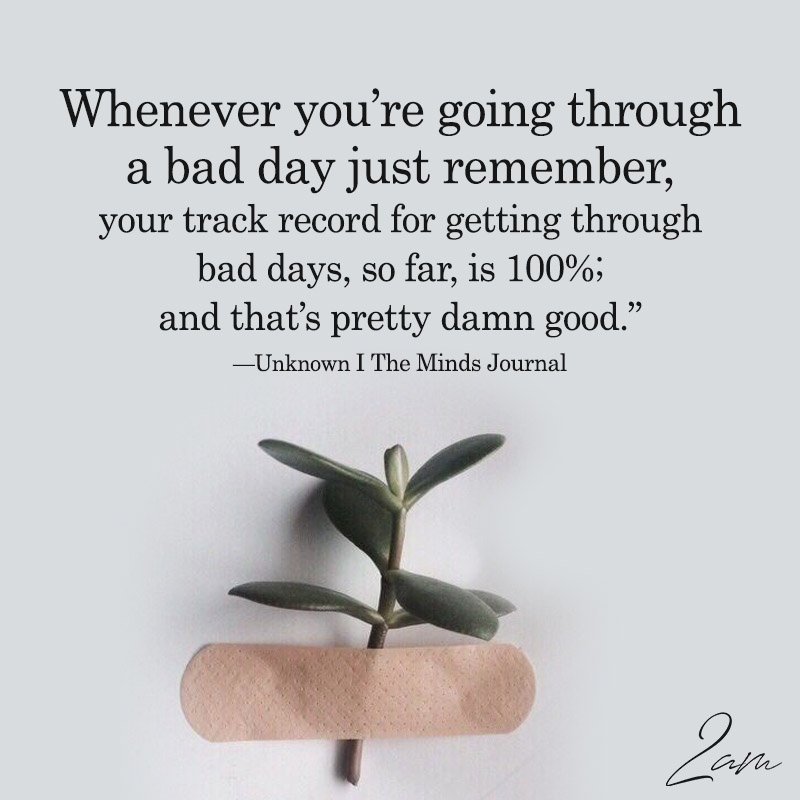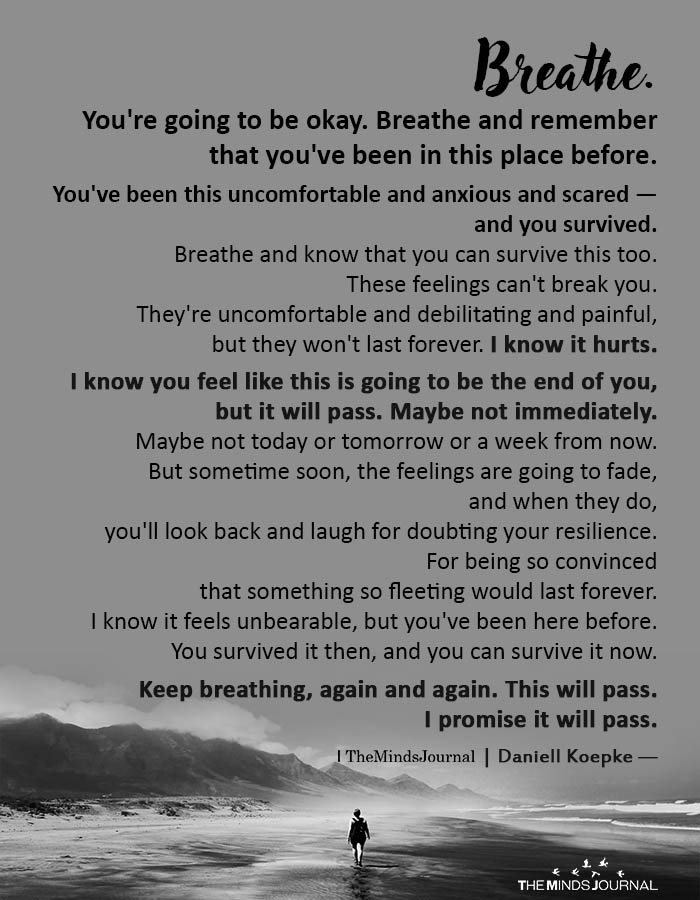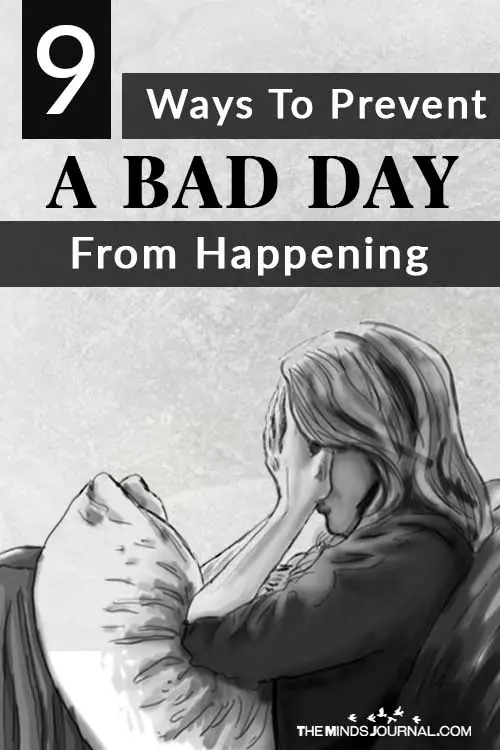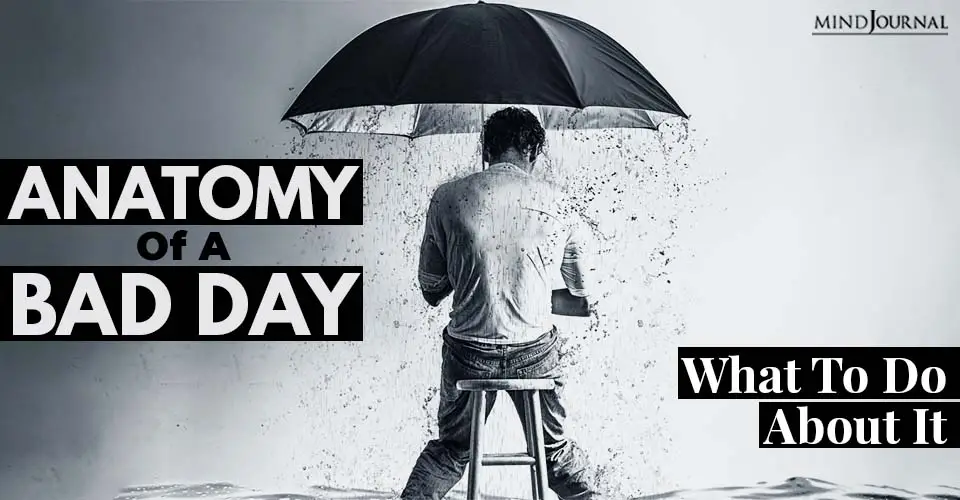We all experience good days and bad days. But sometime’s the bad days can be too much to handle. Whether it is not getting the cab on time or spilled milk, or maybe an argument with peers, even a minor thing can trigger bad days. Luckily, there are some ways to turn a bad day around. So, what can you do when you wake up on the wrong side of the bed?
You know those days when everything seems to go wrong? Here are 9 ways to prevent that from happening.
We’ve all had bad days. Everything seems to go wrong. But what is “everything”?
I consider myself lucky—other than true catastrophes, like the death of a loved one or someone being diagnosed with cancer —I haven’t had a run-of-the-mill bad day in a long time. You know, the kind where all sorts of little bad or seemingly unlucky things happen, one after another, until you just want to throw your hands up in the air or crawl back into bed.
When I have had a bad day, here is what it looks like.
Not all bad days have all these elements, but there is a pattern of the *types* of things that happen.
I lose something.
I break something.
I bump my elbow (or head or knee) so hard I say “Owwwww”.
I get a phone call from someone who used to like me but now doesn’t anymore.
I screw up something at work.
I get an unexpected bill or learn about a new expense needed.
I make a mistake and have to do something all over again. But I don’t have time to do that thing over. I had only set aside enough time if things went perfectly.
I make a mistake that causes harm that cannot be corrected, even if I start from scratch again.
I make a mistake that causes harm that can be corrected, but it will cost money and/or time to do so.
I get lost.
Someone I love has a problem that I can’t help them with.
When all or any of those things happen—yeah, it’s a bad day. But I’ve learned that there are ways to prevent almost all of those things from happening. And there are ways to deal with them when they do.

How to prevent a bad day when everything seems to go wrong
1) Embrace technology:
Interestingly enough, technology has actually solved a lot of the problems of bad days that used to haunt me.
Who gets lost anymore? And if you break something, a few clicks and you can get a new one. Technology helps keep things organized so unexpected expenses aren’t as likely to happen. Technology helps me to plan better. And if I do get that call from someone that I know doesn’t like me? Technology is adept at helping me keep them at bay.
Read How To Use Social Media To Build A Deeper Relationship With Your Teen
2) Work wherever you are going, and never be late again:
A hallmark of a bad day used to be if I was running late. But you know what? That almost never happens anymore, at least not since my kids have all moved out of the house. When I have to be at a certain place at a certain time, I simply bring my laptop, get to the place I need to be early, and work from wherever I need to be.
This works like a charm for all sorts of things—airports, doctor’s appointments, business meetings. I never feel like I’ve wasted time by getting someplace early, and I’m super productive once I’m there. I heard it said that the people who get the most done are the ones who know how to use the time in between things that other people let go to waste.
Just because you’re having a bad day doesn’t mean you’re having a bad life.
3) Enjoy all journeys:
Another thing that helps is that I’ll often build in a way to walk or bike part of the way. So now I’ve combined exercise into something that used to be just a chore. The more enjoyable the journey is, the less likely it is to go horribly wrong.
Read 3 Practical Places To Begin The Journey of Finding Yourself
4) How to avoid screwing up at work:
Because I have lots of “in-between time” when I get things done, I use that time for planning, list-making, email responding—and the smaller tasks that get in the way of real strategic thinking or difficult executions and project management.
Also, know the difference between a mistake and actually “screwing up”. A simple mistake is just something you have to do twice. A screw-up means you’ve caused harm that will need additional resources to fix. But either way, the solution is simple: Hold yourself accountable and fix it.
Read 10 Ways For Introverts To Power Up At Work
5) Plan on doing new things two or three times before you get them right:
One of those life-changing ideas I heard once was that when you are doing something for the first time, it often takes two or three times to get it right.
If that’s the case—it means getting it wrong the first time isn’t even a mistake, it’s just part of the process. Plan for it! Don’t expect to get something done in 30 minutes just because someone else could get it done in 30 minutes.
You have no idea how many times they’ve done that same thing before. Chances are there is going to be a piece of what you are doing that you are going to have to figure out, and that figuring out means trying two or three things in the process. No need to count that process towards a bad day—simply reframe it as a learning experience.
6) If you make a mistake, hold yourself accountable and fix it.
This is one of the best ways I know to turn bad days back into good ones.

Read Are These 8 Hidden Mistakes Ruining Your Relationship?
7) Buy fewer things. This actually helps prevent a lot of problems!
The fewer things you buy, the less you have to manage. The less complicated things are. If you don’t buy anything, it can’t break or get lost. And guess what! You are less likely to bump into things you don’t have. And of course, the obvious—if you don’t spend money on things you don’t really need, you’ll have that money to fix those mistakes when they happen.
8) If something has even the potential to cause catastrophic harm, heed the warnings.
This includes using heavy machinery, engaging in risky activities, using something that might cause fire or explosion, or even driving a car. It also means taking preventative measures with your health—doctors’ visits, self-checks, eating right, getting enough sleep, and exercise.
9) Take time to breathe, get outside, and connect with others.
Just by doing those things, your bad day can become simply “life”.

Have a good day! And I mean that sincerely!
Written by Lisa Hickey
Originally appeared in The Goodmen Project










Leave a Reply
You must be logged in to post a comment.